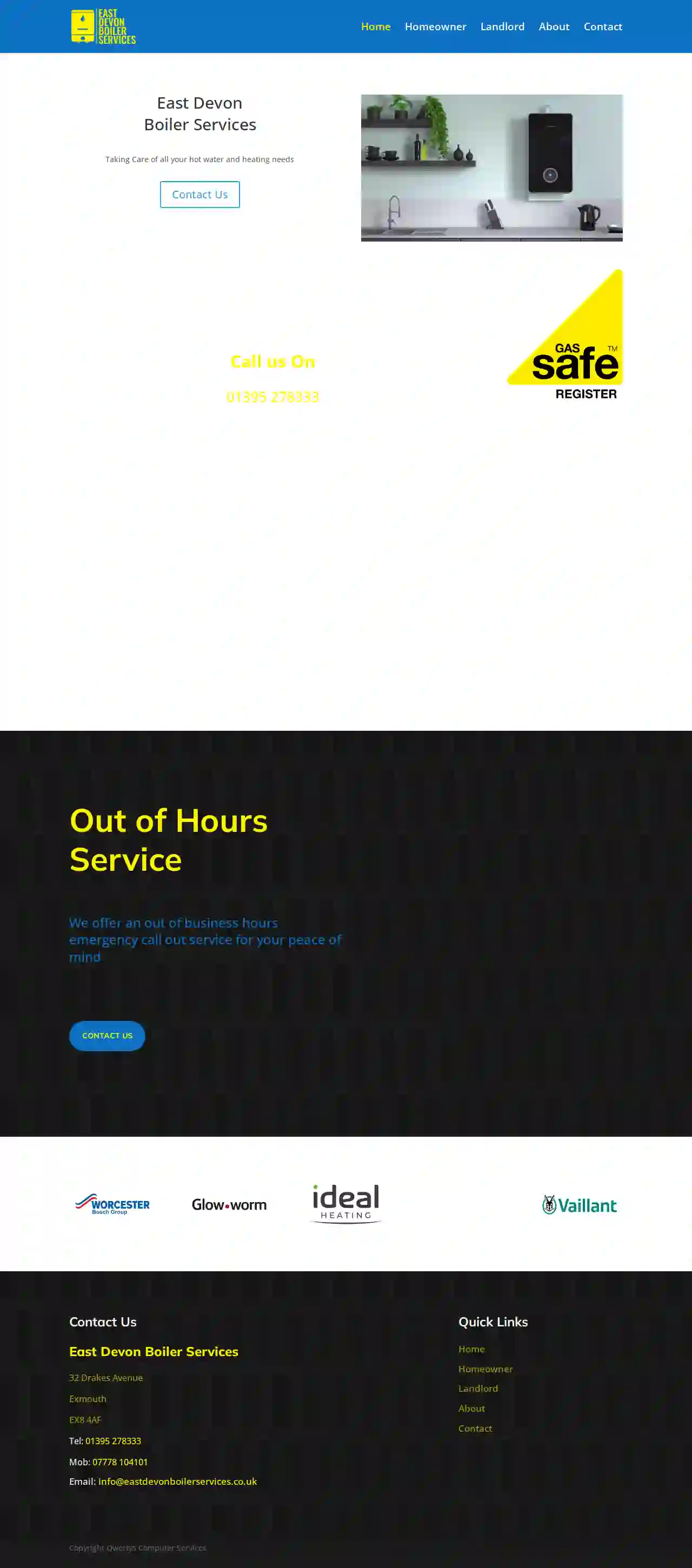AC Repair Exmouth
Top 10 Air Conditioner Repair in Exmouth
Receive up to 3 AC Repair quotes for your project today! Compare profiles, reviews, accreditations, portfolio, etc... and choose the best service.
- Ni
Nick The Brick
52 reviewsExmouth, GB- Services
- Why Us?
Get Quote - Pl
Plumbase Exmouth
4.85 reviewsExmouth, GB- Services
- Why Us?
Get Quote - H
H Carter & Sons
4.936 reviewsExmouth, GB- Services
- Why Us?
Get Quote - Pl
Plumb 'n' Heat Ltd
530 reviewsExmouth, GB- Services
- Why Us?
Get Quote 
Gas Call
52 reviews100 London Road, Southend-on-Sea, SS0 9AA, GBGas Call is a family-run business with over 20 years of experience in the gas industry. We are fully qualified and insured, and we pride ourselves on providing a reliable and efficient service. We offer a wide range of gas services, including boiler installations, repairs, and servicing. We also offer a 24/7 emergency call-out service. Our team of experienced engineers is dedicated to providing our customers with the highest quality service. We are committed to safety and compliance with all relevant regulations. We are also members of Gas Safe Register, which is the official gas safety register in the UK. We are a local business, and we are proud to serve our community. We offer competitive prices and a friendly, professional service. We are always happy to answer any questions you may have about our services.
- Services
- Why Us?
- Accreditations
Get Quote
East Devon Boiler Services
132 Drakes Avenue, Exmouth, EX8 4AF, GBWe are a local fully insured gas safe registered heating company based in Exmouth, covering East Devon and beyond. With over 30 years’ experience in the domestic gas industry, we specialise in servicing, repairs and installation of domestic natural gas boilers, vented and unvented hot water cylinders and their controls.
- Services
- Why Us?
- Gallery
Get Quote- A
A & S Kingdon Ltd
4.533 reviewsExmouth, GB- Services
- Why Us?
Get Quote - Pr
Pro-Heat Plumbing & Heating
51 reviewsExmouth, GB- Services
- Why Us?
Get Quote - MI
MICHAEL CLARKE LTD
4.418 reviewsExmouth, GB- Services
- Why Us?
Get Quote - AD
ADC Heat Pumps & Underfloor Heating
4.611 reviewsExmouth, GB- Services
- Why Us?
Get Quote
Over 16,895+ HVAC Contractors in our network
Our HVAC companies operate in Exmouth and surrounding areas!
HVACCompaniesHub has curated and vetted the Best HVAC Businesses in and around Exmouth. Find the most trustworthy contractor today.
Frequently Asked Questions About AC Repair
- Warm Air from Vents: Instead of cool air, your vents are blowing warm or room-temperature air.
- Insufficient Cooling: The AC is running, but your space isn't cooling down sufficiently.
- Unusual Noises: Squealing, grinding, banging, or other odd sounds are often signs of mechanical issues.
- Strange Smells: Burning odors, musty smells, or other unusual odors indicate potential problems like electrical issues or mold growth.
- Leaking Water: Water leaks around the indoor unit can indicate a clogged drain line or other drainage problems.
- High Energy Bills: A sudden increase in your energy bills might be due to a struggling or inefficient AC unit.
- Short Cycling: The AC unit turns on and off frequently, without completing a full cooling cycle.
- Regular maintenance: Schedule annual or biannual professional tune-ups to keep your system in peak condition.
- Programmable thermostat: Optimize temperature settings based on your schedule and occupancy.
- Seal air leaks: Prevent air leakage by sealing gaps around windows and doors.
- Adequate insulation: Ensure proper insulation to minimize heat gain and loss.
- Strategic landscaping: Plant trees or shrubs to shade your home from direct sunlight.
- Ventilation: Improve ventilation to remove excess heat and humidity, reducing reliance on AC.
- Energy-efficient windows: Upgrade to double-paned or energy-efficient windows to keep heat out during hot spells.
- Regularly clean/replace air filters: A clean filter optimizes airflow and efficiency.
- Consider upgrading your unit: Older models are usually far less efficient. . If your unit is over 10 years old, consider replacing it with a high-efficiency model.
What is the difference between a central AC and a heat pump?
Can a dirty air filter cause my AC to freeze up?
How do I know if my AC needs repair?
How can I make my AC more energy-efficient?
What is the difference between a central AC and a heat pump?
Can a dirty air filter cause my AC to freeze up?
How do I know if my AC needs repair?
- Warm Air from Vents: Instead of cool air, your vents are blowing warm or room-temperature air.
- Insufficient Cooling: The AC is running, but your space isn't cooling down sufficiently.
- Unusual Noises: Squealing, grinding, banging, or other odd sounds are often signs of mechanical issues.
- Strange Smells: Burning odors, musty smells, or other unusual odors indicate potential problems like electrical issues or mold growth.
- Leaking Water: Water leaks around the indoor unit can indicate a clogged drain line or other drainage problems.
- High Energy Bills: A sudden increase in your energy bills might be due to a struggling or inefficient AC unit.
- Short Cycling: The AC unit turns on and off frequently, without completing a full cooling cycle.
How can I make my AC more energy-efficient?
- Regular maintenance: Keep up with regular checkups and maintenance to keep your system in peak condition.
- Programmable thermostat: Optimize temperature settings based on your schedule and occupancy.
- Seal air leaks: Prevent air leakage by sealing gaps around windows and doors.
- Adequate insulation: Ensure proper insulation to minimize heat gain and loss.
- Strategic landscaping: Plant trees or shrubs to shade your home from direct sunlight.
- Ventilation: Improve ventilation to remove excess heat and humidity, reducing reliance on AC.
- Energy-efficient windows: Install double glazing to minimize heat transfer.
- Regularly clean/replace air filters: A clean filter optimizes airflow and efficiency.
- Consider upgrading your unit: Older models are usually far less efficient. . If your unit is over 10 years old, consider replacing it with a high-efficiency model.